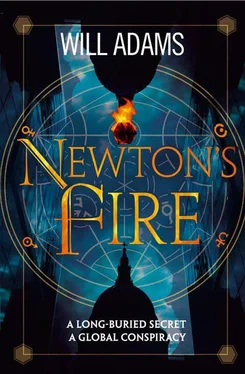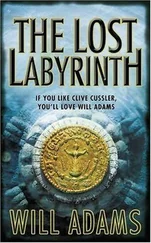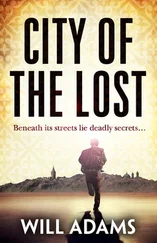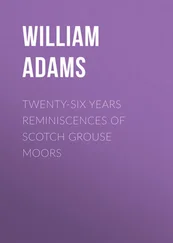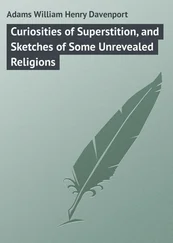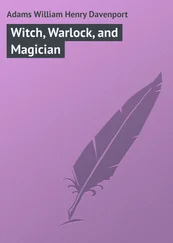Will Adams - Newton’s Fire
Здесь есть возможность читать онлайн «Will Adams - Newton’s Fire» — ознакомительный отрывок электронной книги совершенно бесплатно, а после прочтения отрывка купить полную версию. В некоторых случаях можно слушать аудио, скачать через торрент в формате fb2 и присутствует краткое содержание. Жанр: Триллер, на английском языке. Описание произведения, (предисловие) а так же отзывы посетителей доступны на портале библиотеки ЛибКат.
- Название:Newton’s Fire
- Автор:
- Жанр:
- Год:неизвестен
- ISBN:нет данных
- Рейтинг книги:5 / 5. Голосов: 1
-
Избранное:Добавить в избранное
- Отзывы:
-
Ваша оценка:
- 100
- 1
- 2
- 3
- 4
- 5
Newton’s Fire: краткое содержание, описание и аннотация
Предлагаем к чтению аннотацию, описание, краткое содержание или предисловие (зависит от того, что написал сам автор книги «Newton’s Fire»). Если вы не нашли необходимую информацию о книге — напишите в комментариях, мы постараемся отыскать её.
Newton’s Fire — читать онлайн ознакомительный отрывок
Ниже представлен текст книги, разбитый по страницам. Система сохранения места последней прочитанной страницы, позволяет с удобством читать онлайн бесплатно книгу «Newton’s Fire», без необходимости каждый раз заново искать на чём Вы остановились. Поставьте закладку, и сможете в любой момент перейти на страницу, на которой закончили чтение.
Интервал:
Закладка:
‘But electricity had been around forever,’ pointed out Rachel. ‘Lightning was the weapon of the gods, remember? Not exactly secret fire.’
‘Its nature was secret,’ said Luke. ‘No one understood it.’
‘Yes, they did,’ said Rachel, shifting in her seat to stop the wind whipping hair around her face. ‘Not perfectly, I agree, but surely enough to demystify it. You get static everywhere, for one thing. And they knew it was connected with magnetism. The word electricity comes from the Greek for amber, electrum, because amber attracts or repels other objects when you rub it. And what about those Baghdad batteries?’
‘What about those what?’ frowned Luke.
‘Baghdad batteries. You must have heard of them.’
He shook her head. ‘What are they?’
‘There was this excavation near Baghdad just before the Second World War. They found these really weird earthenware jars with copper rods sticking up from their bottoms. Two thousand years old, give or take. Turns out they were most likely primitive electrical devices that used vinegar or some other acid to electroplate silver and other metals with gold.’
‘Are you serious?’ frowned Luke.
‘Of course I’m serious. You think I’d make them up?’
But Pelham held up a hand for silence before Luke could answer. ‘Oddington, guys,’ he said, nodding at a sign. ‘We’re here.’ He slowed almost to jogging pace as he searched memory and the twilit lanes for Olivia’s house. ‘There she is,’ he said at last, swinging down a potholed track bordered by wild shrubberies before pulling up in front of a low thatched house of vivid pink that sagged perceptibly in its middle, so that the frame of the front door splayed out towards the foot, leaving gaps for the winter wind. They slammed their doors to give notice of their arrival, and Pelham rapped out Beethoven with the knocker.
‘Who is it?’ asked a woman warily. ‘Who’s there?’
‘It’s me,’ boomed Pelham. ‘Pelham Redfern the Third. Your friendly neighbourhood alchemist, remember? All lead turned into gold.’
Rustling inside, keys turning and bolts sliding and the door creaked open, revealing a tall, angular woman with silver hair swept back in a tight bun, reading glasses on a frayed grey string around her neck. ‘Pelham,’ she said, with the nervous warmth of a schoolmarm welcoming back some troublesome old boy. ‘Whatever brings you here?’
‘Hell of a story,’ he said. ‘I’m going to need a glass of your excellent whisky and water to help me tell it. But first let me introduce my two companions. This is Rachel Parkes of the great Caius College, Cambridge. And my old friend Luke Hayward, currently writing the definitive biography of Sir Isaac Newton.’
Olivia frowned. ‘There was a flap in London last year about a Newton scholar called Luke Hayward.’
‘Yes,’ agreed Luke. ‘There was.’
Olivia was silent a few moments, assimilating this information. ‘I knew your Vice Chancellor at university,’ she said finally. ‘He was a prick then, too.’ She stood aside to welcome them in, closed the door behind them, gestured them through. The passage was low with ancient beams, its walls crowded with portraits of the saints and religious curios. They reached a gloomy living room. She invited them to sit. ‘Now, then,’ she said, as they all settled into their various chairs. ‘Which one of you three wants to tell me what this is all about?’
III
The Israeli Prime Minister took the news better than the Chief of the General Staff had dared hope. ‘The Chinese, you say?’ she asked.
‘Most likely,’ he told her. ‘Maybe the Russians.’
‘You don’t think …’ She hesitated, unsure whether to voice her thought.
‘Yes, Prime Minister?’
‘You don’t think there’s any chance the Americans might have been behind it?’
The General was surprised by the suggestion, but he took it seriously. Unlike many of his comrades, who mistook her dovishness for weakness, he respected his new Prime Minister. Her character, if not her policies. Nor did he romanticize Israel’s relationship with the Americans, but saw it rather as the product of interests that were usually, but not invariably, aligned. ‘Why would you suggest that?’ he asked.
‘They have the best engineers. They know our systems better than anyone, and therefore its weak points too. And I’m about to announce a more pro-European foreign policy. Could this be Washington’s way of reminding us of just how badly we need them?’
‘Worms like these take years to design,’ he told her. ‘And we think infiltration was only made possible by the earthquake. Your speech is a coincidence.’
‘Good.’ She looked relieved. ‘But you’re about to tell me to put it back in my bottom drawer, aren’t you?’
‘No, Prime Minister,’ he said. ‘I came here meaning to. But now I think that would be a mistake.’
‘I thought you abhorred my new policy.’
‘I do. But it’s been too well trailed. Drop it now and you’ll signal weakness. Whoever infiltrated the worm will know that we’ve found it, and that we’re worried. The less information we give them, the better.’
The Prime Minister nodded. ‘I’ll take it down a notch.’
‘Yes, Prime Minister.’
She sat back in her chair, stared up at the ornately plastered ceiling. ‘What’s your gut telling you?’ she asked. ‘About our neighbours, I mean. Is all their recent bluster and skirmishing just the usual nonsense. Or are they girding up for something?’
‘I think it’s the usual nonsense. A war would only work if they all came at us at the same time. They don’t trust each other enough for that.’
‘No.’
‘Besides, their regimes are still too precarious. They need their people with them. And their people don’t want new wars. They want jobs, food, the promise of things getting better.’
‘Don’t rely too heavily on that,’ she said. ‘They’re frustrated and they’re angry; and it doesn’t take much to turn frustrated, angry people against a common enemy. A stray missile on a wedding party. A firebomb in a mosque.’
‘Some Third Temple fanatic taking down the Dome,’ smiled the Chief of the General Staff.
She gave a little shudder, shook her head. ‘Don’t even joke about it,’ she said.
‘No, Prime Minister.’
IV
It was Luke who got the nod from Pelham. ‘I found something earlier today,’ he told Olivia. ‘A folder of lost Newton papers.’
Her eyes glinted and she leaned forwards in her chair. ‘One of the Sotheby’s lots? How thrilling! But what do they have to do with me?’
He passed her the relevant page of the printout and directed her attention to Newton’s cryptic message. Olivia put on her reading glasses, held it up to the light of an ebony lamp. ‘Ah,’ she said. ‘Received from E.A. — and you’re thinking Elias Ashmole?’
‘Newton wrote this in 1692,’ said Luke. ‘At least, that’s what the citations and watermark suggest. Ashmole died in May that year. So we think it was probably a bequest.’
Olivia shook her head. ‘But why would Ashmole leave anything to Newton? They hardly knew each other.’
‘We don’t know that,’ said Luke. ‘Not for sure. They could easily have known each other well through the alchemists’ network.’
‘The alchemists’ what?’ asked Rachel.
‘All the alchemists were in surreptitious contact with one another,’ explained Olivia. ‘They had to be, to trade their texts and furnaces, share their potions and theories. So we have overwhelming evidence for some kind of network, but sadly we know next to nothing about how it worked.’
Читать дальшеИнтервал:
Закладка:
Похожие книги на «Newton’s Fire»
Представляем Вашему вниманию похожие книги на «Newton’s Fire» списком для выбора. Мы отобрали схожую по названию и смыслу литературу в надежде предоставить читателям больше вариантов отыскать новые, интересные, ещё непрочитанные произведения.
Обсуждение, отзывы о книге «Newton’s Fire» и просто собственные мнения читателей. Оставьте ваши комментарии, напишите, что Вы думаете о произведении, его смысле или главных героях. Укажите что конкретно понравилось, а что нет, и почему Вы так считаете.
